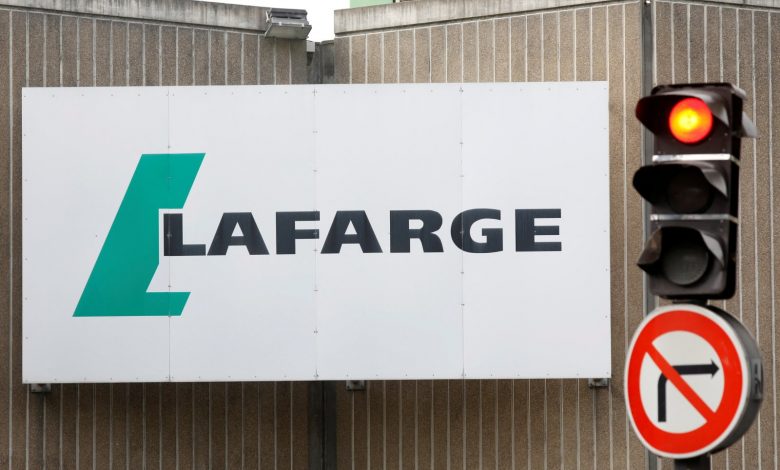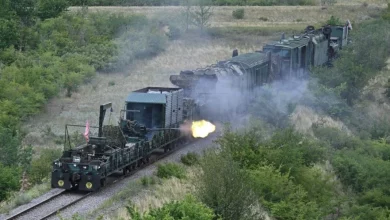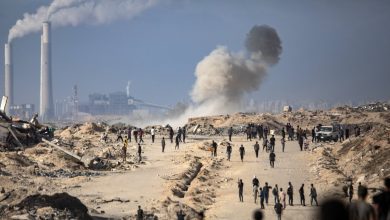France’s Lafarge pleads guilty to working with Daesh in Syria

French cement giant Lafarge will pay more than three-quarters of a billion dollars after pleading guilty to U.S. charges of providing material support to two designated terrorist groups including Daesh, the Justice Department announced
“Lafarge made a deal with the devil, foreign terrorists who pledged to, and in fact did, harm the United States, its people and its national security, and they did it for profit,” U.S. Attorney for the Eastern District of New York Breon Peace told reporters as the Justice Department announced the plea deal.
“In the midst of a civil war, Lafarge made the unthinkable choice to put money into the hands of ISIS, one of the world’s most barbaric terrorist organizations, so that it could continue selling cement,” Peace said, using another acronym for Daesh.
“This unprecedented charge and resolution reflect the extraordinary crimes committed and demonstrates that corporations that take actions in contravention of our national security interests in violation of the law will be held to account,” he added.
District Judge William Kuntz ordered Lafarge to pay more than $777 million in what is an unprecedented settlement in which a corporation has pled guilty in a U.S. court to aiding two designated terrorist groups, including Daesh and al-Qaida’s Syrian offshoot Hayat Tahrir al-Sham (HTS), formerly known as the Nusra Front.
Lafarge paid the terror groups from 2013 through 2014 for protection and to allow the continued operation of a cement plant in northern Syria run by Lafarge’s local subsidiary, Lafarge Cement Syria (LCS). In total, nearly $6 million was sent to the two groups, according to prosecutors.
The payments allowed the company’s employees to pass through checkpoints surrounding the Jalabiya cement plant and the company “eventually agreed” to pay Daesh based on the volume of cement it sold, which executives likened to paying “taxes,” according to the Justice Department.
“The terrorism crimes to which Lafarge and its subsidiary have pleaded guilty are a vivid reminder of how corporate crime can intersect with national security,” Deputy Attorney General Lisa Monaco said in a statement.
“This case sends the clear message to all companies, but especially those operating in high-risk environments, to invest in robust compliance programs, pay vigilant attention to national security compliance risks, and conduct careful due diligence in mergers and acquisitions,” she added.
Holcim, which acquired Lafarge in 2015, said it supports the plea agreement and maintained “none of the conduct involved Holcim.”
“It is in stark contrast with everything that Holcim stands for,” the company said in a statement. “Lafarge SA and LCS have accepted responsibility for the actions of the individual executives involved, whose behavior was in flagrant violation of Lafarge’s Code of Conduct. We deeply regret that this conduct occurred.”
Turkish state-owned Anadolu Agency (AA) was the first to report links between the payments and French intelligence services, obtaining in 2021 documents that showed Paris was aware that Lafarge was financing Daesh.
The records indicated that the French intelligence agencies used Lafarge’s relationship with terrorists in Syria to acquire information from the region. They also revealed that French intelligence services did not warn the company that they were committing a crime.
According to the documents, the relations between Lafarge and French intelligence started on Jan. 22, 2014, when the company’s security director, Jean-Claude Veillard, sent an e-mail to the Interior Ministry’s intelligence directorate.
Veillard said the company needs to maintain relations with “local actors” to be able to continue its operations in Syria. Recalling the negative news that appeared in the public about the company, he asked whether executives and the company were under threat.
The intelligence officer, in response, told Velliard that the issue would be addressed at a later date. The agent, who has been dubbed “AM 02,” appeared in court on Nov. 18, 2018, and admitted Lafarge was his source of information in Syria.
“We approached the situation purely opportunistically, taking advantage of Lafarge’s continued work,” the individual testified.
The documents obtained by media indicate that there were more than 30 meetings between Lafarge and French domestic, foreign and military intelligence services between 2013 and 2014.
Lafarge began operating a 680 million euro ($670 million) cement plant in northern Syria in 2010, the year Daesh swept the region with a brutal campaign to establish its extremist “caliphate.”
That sparked a counteroffensive by the Iraq military and Syrian forces backed by the U.S.-led international coalition in the region.
The U.S. designated Daesh and the Nusra Front as terror organizations, threatening tough penalties against anyone working with them.
Rather than withdraw like other companies, Lafarge kept working to market its cement, the Justice Department said.
From 2013 to 2104, it paid Daesh and the Nusra Front around $5.9 million, with some of the money for raw materials, some as payments based on the volume of cement sold and some simply as monthly “donations.”
Lafarge paid another $1.1 million to intermediaries between the two groups.
It also worked out a deal with Daesh to make it harder for cheaper Turkish cement suppliers to sell their goods in the same area, allowing Lafarge to keep its prices higher.
Sharing ‘the cake’
Company executives knew of the arrangement, the Justice Department said.
In 2014, a senior supervisory official who reported directly to Lafarge’s chief executive wrote to officials in the Syria subsidiary about negotiations with Daesh.
“We have to maintain the principle that we are ready to share the ‘cake,’ if there is a ‘cake,'” he wrote, defining cake as “profit.”
Lafarge “negotiated and made unlawful payments at a time when these groups were gaining territory and brutalizing innocent civilians in Syria and elsewhere and were actively plotting against Americans,” said U.S. Assistant Attorney General Matthew Olsen.
Lafarge still faces charges in France for complicity in crimes against humanity.
In May, a French appeals court approved the charge, opening the door for a trial of the company and eight executives, including former CEO Bruno Lafont.
Lafarge continues to fight that case, but now faces the possibility of the introduction of evidence from the U.S. prosecution.
Unlike in the United States, it does not have the option of negotiating a settlement, which is disallowed under French anti-terrorism statutes.
No date for a trial of Lafarge and eight of its executives has been set yet in France.
A French lawmaker on Tuesday also slammed the inaction of France over cement giant Lafarge’s financing of the Daesh terror group.
“The U.S. has penalized Lafarge for financing Daesh. What about France?” Clementine Autain asked on Twitter after Lafarge pleaded guilty to aiding the terror group in the U.S. court.
Noting that she appealed to the government on the issue “so many times” but her efforts were “in vain,” Autain said: “Silence and inaction are culpable.”
Autain continued her criticism of the French government, saying “those who teach patriotism are not on the market.”
Previously, Türkiye’s anti-terror operations in northeastern Syria have once again revealed the security threats that arise when terrorist groups usurp infrastructure and manufacturing facilities.
In a speech in 2019, President Recep Tayyip Erdoğan censured the vast amount of ammunition and heavy weapons provided for the PKK’s Syrian branch YPG by Türkiye’s allies, particularly the U.S. He also raised another important risk for Türkiye’s national security – as the YPG is not only equipped with arms and ammunition but significant facilities such as Lafarge’s vast plant in Jalabiya, which is used as a base and manufacturing site for the group.
“We are seeing 90-kilometer-long tunnels in northern Syria. How do they build these tunnels? Where is the cement to construct them coming from?” the president asked. “The cement for the tunnel construction comes from Lafarge’s plant in the region, a French firm,” he said, demanding an explanation from France, another one of Türkiye’s allies in NATO.





